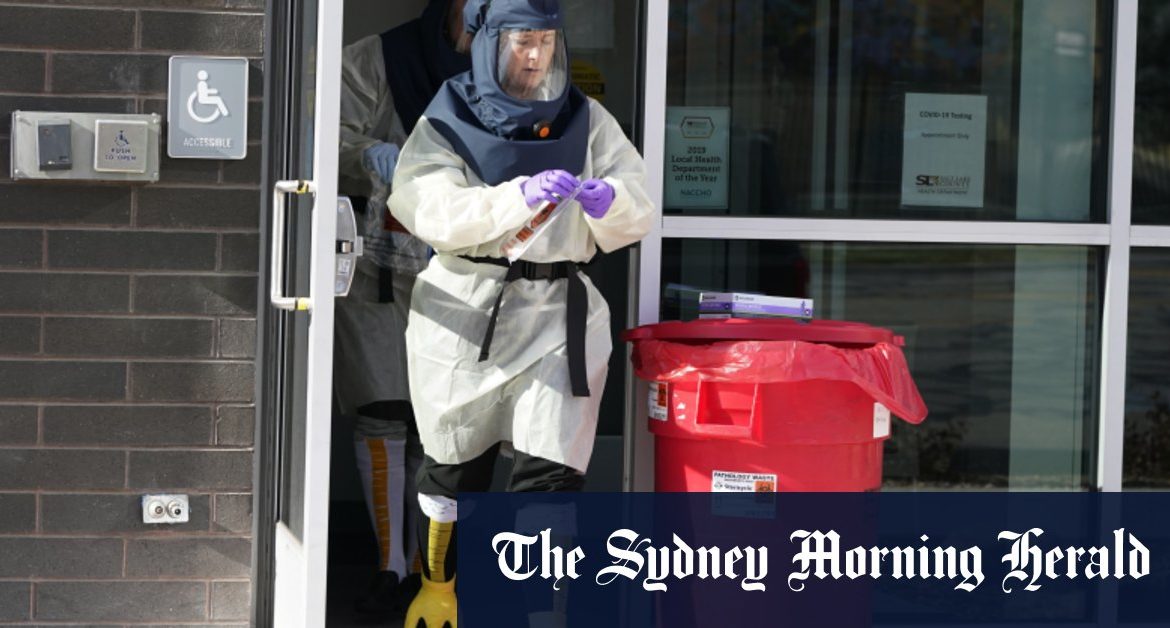In Germany, Chancellor Angela Merkel agreed with leaders of all 16 federal states to extend and tighten measures against the coronavirus until at least December 20 and likely into January, she said.
“This is absolutely not the time to sound the all-clear,” she told journalists, after the number of deaths from the virus reached a daily record.
However, rules would be eased over the Christmas holidays to let families and friends celebrate together – the current five-person limit on private gatherings will be lifted to 10 not counting children.
Germany imposed a month-long “lockdown lite” on November 2 to rein in a second wave that is sweeping much of Europe. Bars and restaurants are closed, but schools and shops remain open.
“This must not be a lonely Christmas for people in vulnerable groups,” she said.
The number of confirmed COVID-19 cases increased by 18,633 to 961,320, daily data from the Robert Koch Institute (RKI) for infectious diseases showed on Wednesday, 5015 less than the record increase reported on Friday. However, the death toll jumped 410 to 14,771, up from 305 a week ago, and just 49 on November 2.
“The exponential growth of infection numbers has been stopped, the steep curve has been turned into a flattened curve,” Merkel said. “But we cannot be content with this partial success,” she added.
In Belgium health authorities are launching a new testing strategy to halt the spread of the disease, incorporating rapid antigen kits with more reliable and standard molecular tests.
Until now, the country has relied on standard kits, known as PCR tests, which detect the genetic material of the virus. Rapid antigen tests provide quicker results but are not as reliable.
Belgium’s top government coronavirus official Pedro Facon said a taskforce was being set afoot to move the country into what is dubbed testing strategy 2.0.
Military personnel, wearing full protective equipment, clean their hands after disinfecting an ambulance used to carry a coronavirus COVID-19 patient in Brussels.Credit:AP
Facon said that “scientific studies are showing that in patients with symptoms, rapid antigen tests are almost as reliable as PCR tests if they are done in the first five days after the symptoms appear.”
He says that in cases where people are strongly suspected to have the disease but produce a negative rapid test, a separate PCR test will be conducted to reduce the risk of cases slipping through.
Belgium is one of the European countries worst hit by the virus in per capita terms. As of Wednesday, more than 561,000 people had contracted the disease in a country with a population of around 11.5 million people. More than 15,900 have died.
In Austria, Chancellor Sebastian Kurz pushed back against calls to write off this year’s ski season because of the pandemic. The ski resort of Ischgl became a hotspot for infection in March, with foreign tourists from across Europe carrying the virus back to their home countries after authorities there failed to react swiftly to an outbreak.
But Kurz told reporters in Vienna on Wednesday that Austria’s ski resorts would be treated in the same way as other businesses when a decision is made whether to relax lockdown measures after December 6.

A few people walk in Istiklal street, the main shopping street in Istanbul, minutes into a coronavirus lockdown on Saturday.Credit:AP
In Turkey, President Recep Tayyip Erdogan said his country’s own vaccine against COVID-19 could be ready for use by April.
The vaccine, ERUCOV-VAC, is being developed by Erciyes University, in the central Turkish province of Kayseri, and is currently undergoing phase 1 of testing.
The country’s daily COVID-19 infections have jumped above 28,000 after the government resumed publishing all positive cases. It had been accused of hiding the full extent of the crisis by omitting asymptomatic cases in data published since July 29.
Health Minister Fahrettin Koca announced 28,351 new infections in the previous 24 hours, emphasising that the data represented “all people whose PCR tests are positive whether they display symptoms or not.”
Koca on Wednesday, also announced 168 COVID-19 deaths in the previous 24 hours. Turkey had previously been reporting around 6000 daily new patients. The total number of cases since the outbreak started has now passed 467,730, with 12,840 fatalities.

President-elect Joe Biden puts on his face mask after a press conference on Tuesday.Credit:AP
In the United States, President-elect Joe Biden is urging caution during the Thanksgiving holidays, asking people to forgo big family gatherings, wear masks and maintain social distancing, as different states and cities take stricter precautions to halt the spread of the disease.
“I know we can and we will beat this virus,” Biden said, acknowledging that Americans are feeling pandemic fatigue. “Life is going to return to normal. I promise you. This will happen. This will not last forever.”
Loading
Los Angeles now requires all plane and train passengers to sign a form acknowledging California’s recommended two-week self-quarantine.
Anyone over the age of 16 coming from another state or country must submit the form online before or upon arriving at Los Angeles International Airport, Van Nuys Airport or Union Station or risk a fine of up to $US500 ($678).
Los Angeles Mayor Eric Garcetti announced the requirement as he warned the virus was “threatening to spiral out of control” in Los Angeles.
More than 260,000 Americans have died from COVID-19, with the daily toll on Tuesday surpassing 2000 for the first time since May.
In Asia, WHO noted that Japan reported the largest number of daily cases since the beginning of the outbreak, with more than 2000 reported every day for five consecutive days, a 41 per cent increase from the previous week. Myanmar reported a 74 per cent jump in cases last week, with more than 11,000 new cases and a 36 per cent increase in deaths, at 188.
AP, Reuters
Most Viewed in World
Loading







